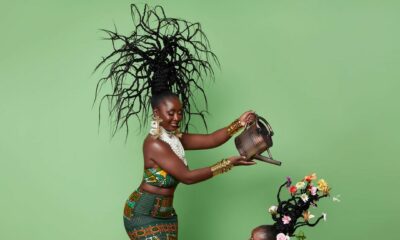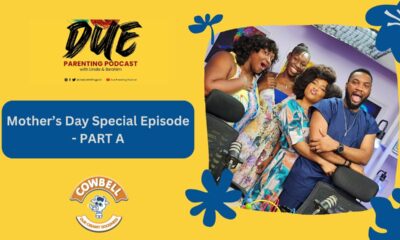Features
Luke Ogar: Your Mother is Someone’s Mother-in-Law
How can our mothers claim to love us if they are a burden to our spouses?
 Love is a great beautifier
Love is a great beautifier
– Louisa May Alcott.
There are so many Mother’s Day commemorations to celebrate that I’ve lost count. On all of such days, there is a massive outpouring of felicitation and goodwill toward these noble women who raise us up to become who we are. The theme is that of heroic love and a sacrifice that transcends their fragile frame, with consistency and devotion to do good to the children and family.
The story would be entirely different if only we did have a Mother’s Day, but for mothers-in-law. The title “mother-in-law” carries a sinister and somewhat nefarious image; but it is the same women who we praise as mothers that are looked upon in a different light as mothers-in-law. Is there some hypocrisy in the praise of mothers but reservation for mothers-in-law? How can our mothers claim to love us if they are a burden to our spouses?
Are mothers-in-law stereotyped as bad and inconsiderate? What is the true face of a woman and mother?
Mother: lover or fighter?
It is very rare to find a mother who does not love her children. The definition of love may vary, but there is resolved to love still. Mothers are faced with the two-step hurdle of carefree juvenility and rebellious adolescence from their children. It is at the end of such “independent” adolescence that children come to love their mothers with conviction. Before such age, they often see their mothers as commanders and fighters rather than lovers. Ironically, it is at this age when there is the least grip of control that children choose the maternal way all the more. Letting go seems to be more beneficial than sitting on their necks.
After coping with the initial hurdle of childhood and adolescence, there is that level of confidence in a mother about how to handle her child, which could be dangerous. It is a grave mistake for her to think that her child’s well-being is solely determined by her excellent advice and care. Mothers can become bloated with pride as caretakers of the “best in the world.” It is wrong to take all the credit for a child’s fortunes, as many mothers tend to do. This is the perfect premise for a good mother being transformed into a hawk of a mother-in-law.
Mother-In-Law: stereotype or reality?
There are good mothers-in-law out there, but they obviously don’t make a good story. Stories that echo are those about evil-scheming in-laws and the ones who decide how the new family is run. It has become the stereotype — a woman who chooses to be difficult toward her child’s spouse. While many of these reports have some truth in them, it is not sufficient to swallow them hook, line and sinker. Again, if we uphold the belief of evil in-laws, would our own mothers not be included too?
Sometimes, it is the overprotective nature of mothers that stirs up trouble. From the perspective of a mother-in-law, it could be a difficult time to absorb all the changes of marriage, especially for their sons. They see a younger woman at the centre of their son’s life, his finance and all other important decisions. With such mindset, there are bound to be many complaints about the manner of spending, welfare of both extended families, the difference in upbringing and/or culture, etc.
All of these arise from an erstwhile belief that they would lose influence in their children’s lives because of a new marriage.
Children: advocates or conspirators?
Where there are evil mothers, evil children abound. If we keep hearing tales about difficult mothers-in-law, it only means that there are difficult children too. Or, in the least, ones who do nothing or say nothing when things go wrong. Because it is the suffering of another, we turn a blind eye when our own mothers become burdens to their children-in-law? Is her maternal love restricted to the immediate family and children?
If there is anything a mother enjoys, it is the praise she begets from her children. When the latter become praise singers and sycophants rather than advocates for truth, even when it is bitter, our society ends up with prowling mothers looking for an in-law to devour. Beyond the veils of long Facebook posts, pictures dusted up from the archives, and a crass exhibition of showmanship, children should not be content with maternal love of family alone; for if our mothers can be cruel to our own spouses, can they be said to really love us? Can my mother love me and despise my spouse? Would she become a hindrance to a position she once took upon as a new member of her own home?
While our society is termed patriarchal, it is motherhood that is the real key to our respective cultures. A mother is the foundation of a home, and in turn, the family is the bedrock of society. The importance of the maternal role cannot be overemphasized; it is inevitable to deal with. But the same importance of a mother can stir up the idea of absolute power that corrupts absolutely.
When tears are shed at wedding ceremonies, they are symbolic of a new beginning, which implies an exodus from the old. The tears are not of hurt or ill-luck, but a change that is necessary. As each story of difficult mothers-in-law pops up, it is a reminder that mothers tend to hold on to the previous stage of life rather than a new one. We too must help them, for they are not as perfect as we pose them to be. Mothers need our support and advice. They are not superwomen — far from it, they need us as much as we need them. The family is the bedrock of society, but it collapses when the elements have no need for one another.



















